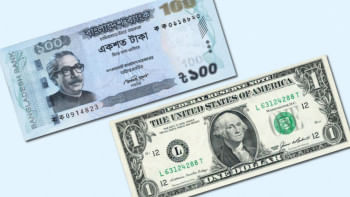Bangabandhu declares independence

March 26, 1971
DECLARATION OF INDEPENDENCE
Just before his arrest, Bangabandhu Sheikh Mujibur Rahman sent a message declaring the independence of Bangladesh. This message was broadcast from Swadhin Bangla Betar Kendro on 26 March, 1971, and was widely reported in newspapers around the world.
"Today Bangladesh is a sovereign and independent country. On Thursday night [March 25, 1971], West Pakistan armed forces suddenly attacked the police barracks at Razarbagh and the EPR headquarters at Pilkhana in Dhaka. Many innocent and unarmed have been killed in Dhaka city and other places of Bangladesh. Violent clashes between EPR and police on the one hand and the armed forces of Pakistan on the other are going on. The Bangalees are fighting the enemy with great courage for an independent Bangladesh. May Allah aid us in our fight for freedom. Joy Bangla," Awami League leader MA Hannan declared on behalf of Bangabandhu.
Meanwhile, Bangabandhu was taken to an unknown place in the evening after his arrest.
YAHYA'S BROADCAST
Today, at 7:00pm in a radio broadcast Pakistan President Yahya Khan addressed the nation from Karachi announcing that he had authorised the armed forces to restore the authority of the government of Pakistan in the East.
Justifying the military action, Yahya said, "Sheikh Mujibur Rahman's action of starting his non-cooperation movement is an act of treason. He and his party have defied the lawful authority for over three weeks. They have insulted Pakistan's flag and defiled the photograph of the father of the nation. They have tried to run a parallel government. They have created turmoil, terror and insecurity."
He declared a ban on all political activities throughout the country, and completely banned Awami League as a political party. He also imposed complete press censorship.
In the evening, Zulfikar Ali Bhutto arrived back in Karachi. "Thank God, Pakistan has been saved," he told journalists waiting for his statement.
A WITNESS ACCOUNT
On March 25, 1971, just before the Pakistan army launched the infamous "Operation Searchlight", the brutal genocide in Dhaka, they locked up foreign journalists at the Intercontinental Hotel, and later sent them directly out of Dhaka, so they could not gather news of their atrocities. British journalist Simon Dring evaded the roundup by hiding on the roof of the Intercontinental Hotel and later went around the city to see firsthand the results of the Army's repression. He published the first news of the genocide in The Daily Telegraph on March 29, 1971.
He wrote:
"Streets were deserted on Friday [March 26, 1971] but there were scattered outbursts of small arms fire and shelling during the day as tanks and trucks loaded with troops in camouflaged combat dress moved through the capital.
"Judging from the clashes in Dacca the number of dead and wounded among civilian populations of important towns will be very high, with light Army losses.
"Communications between Dacca and the rest of the province and also the outside world have been severed and it is impossible to tell in Dacca how the occupation is proceeding."
Shamsuddoza Sajen is a journalist and researcher. He can be contacted at [email protected]

 For all latest news, follow The Daily Star's Google News channel.
For all latest news, follow The Daily Star's Google News channel. 



Comments